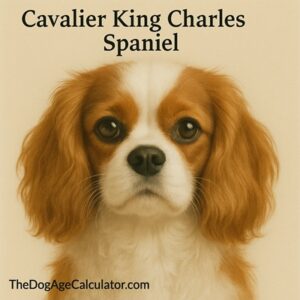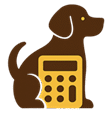
The Cavalier King Charles Spaniel is a small companion dog celebrated for its expressive eyes, silky coat, and affectionate personality. This breed is the focus of our Cavalier King Charles Spaniel Age Calculator, which helps owners translate their pet’s age into human years. With the Cavalier King Charles Spaniel Age Calculator, families can easily understand how their dog’s age compares to a person’s, giving them better insight into health and care. Originally bred as a lapdog for British nobility, the Cavalier King Charles Spaniel has become a beloved family dog across the world. Similar to the Bichon Frise, the Cavalier thrives on companionship and consistent care.
Cavalier King Charles Spaniel Lifespan and Age Calculator Insights
The Cavalier King Charles Spaniel lifespan averages 12–14 years. Owners who use the Cavalier King Charles Spaniel Age Calculator can easily track life stage changes and adapt their care accordingly. Like the Shih Tzu, Cavaliers are known for their affectionate temperament and ability to bond closely with families, which often enhances their quality of life. Though their lifespan is slightly shorter than some other toy breeds, Cavaliers fill their years with joy and companionship.
Longevity depends on good daily habits. Keep weight in a healthy range, schedule routine veterinary checkups, and feed a balanced diet. Regular dental cleanings protect the heart and kidneys. Gentle daily exercise supports joints and keeps muscles strong. Many families also track subtle changes—like sleep length, appetite, or willingness to play—and note them alongside the Cavalier King Charles Spaniel Age Calculator results to spot patterns early.
History plays a part in the breed’s health story. These spaniels were bred as comfort dogs in royal courts and country estates. Their role was to rest in laps, warm hands, and offer calm company during long indoor hours. That history explains their close bond with people today and why they thrive in homes where they are included in daily life.
Cavalier King Charles Spaniel Age Calculator: Human Years Guide
The Cavalier King Charles Spaniel Age Calculator above helps you understand your dog’s development. For example, a one-year-old Cavalier is equivalent to a human teenager, while a 7-year-old Cavalier is like someone in their 40s. This conversion ensures care is tailored to life stage needs. Understanding these equivalents helps owners adjust diet, exercise, and veterinary visits in a timely manner.
Think of this guide as a planning tool. During “teen” years, focus on training and social skills. In “adult” years, keep fitness steady and monitor weight. In “mature” and “senior” years, switch to joint-friendly exercise and ask your vet about senior panels and heart checks. The calculator gives context so changes never feel like guesswork.
Families often use the calculator to plan milestones: when to shift from puppy to adult food, when to shorten hikes, and when to add ramps or orthopedics. These small adjustments, made at the right time, keep Cavaliers comfortable and confident as they grow older.
Life Stages of the Cavalier King Charles Spaniel
Puppy Stage (0–12 months): Early Cavalier Years
Puppy Cavaliers are energetic, curious, and eager to please. They need structured socialization and early grooming routines. Owners familiar with the Maltese will notice similar needs—gentle introductions to brushing, nail trims, and positive training sessions are vital. Early socialization ensures Cavaliers grow into confident and well-mannered adults.
Focus on name recognition, recall, and basic cues like “sit,” “down,” and “leave it.” Keep sessions short and fun. Cavaliers are sensitive; praise and tiny treats work far better than stern corrections. Crate training helps with house manners and offers a safe nap spot. Begin brief alone-time practice to prevent separation anxiety later.
Start puppy-safe exercise: a few short walks, indoor fetch on rugs, and simple nose games. Introduce new sounds—doorbells, vacuums, traffic—at low volume with treats. Invite calm, dog-savvy friends to visit. These experiences make a brave, easygoing adult.
Young Adult (1–3 years)
During this period, Cavaliers are lively, affectionate, and highly trainable. The Cavalier King Charles Spaniel Age Calculator shows this stage as the human equivalent of young adulthood, when energy and learning potential are at their peak. Daily exercise, obedience classes, and mental enrichment activities keep them healthy and happy. Like the Cocker Spaniel, they thrive on interaction and learning new skills.
Try a weekly class or a home routine: five minutes of tricks, five minutes of leash skills, then a calm settle on a mat. Puzzle feeders and slow sniff walks prevent boredom. Rotate toys. Offer safe chews for jaw exercise and dental help. Keep grooming regular—ears, feathering on legs, and tail need gentle detangling.
Practice polite greetings and impulse control around doors and food bowls. Cavaliers love people, so jumping can be a habit. Teach “four paws on the floor” and reward calm sits when visitors arrive. These small manners make everyday life smooth.
Adult (4–7 years)
As adults, Cavaliers balance playfulness with maturity. The Cavalier King Charles Spaniel Age Calculator shows that this stage is similar to a human’s 30s–40s. Owners should monitor diet and activity closely, as Cavaliers can be prone to weight gain. This is also the prime time for preventive health screenings. Like the Papillon, Cavaliers maintain their joyful demeanor while requiring steady routines.
Many adult Cavaliers excel as therapy dogs. Their gentle nature, soft expression, and calm cuddle style are comforting in schools and care centers. If you are interested, ask a trainer about therapy dog evaluations. Meanwhile, keep up with annual exams, listen for heart murmurs, and maintain dental care to reduce long-term risk.
Enrichment ideas: hide treats around a room for scent work; teach a “find it” cue; try low-impact agility like tunnels and cavaletti poles set very low. These activities work the mind and body without strain.
Mature (8–11 years)
Mature Cavaliers begin to slow down. Joint health, dental care, and weight management are essential. Their needs mirror those of the Miniature Poodle. At this stage, the Cavalier King Charles Spaniel Age Calculator highlights their transition into senior life. Regular vet visits and supplements for heart and joint support are especially important for Cavaliers, as they are prone to heart issues.
Adjust routines gently: shorter walks, more frequent rest breaks, and soft, supportive bedding. Keep nails trimmed so toes can grip floors. Consider non-slip runners on slick surfaces. Use raised bowls if bending seems hard. Small comfort changes protect joints and build confidence.
Mentally, mature Cavaliers still love learning. Teach quiet games like “touch” (nose to hand) or “target” (nose to a post-it). These tiny skills keep the brain sharp and make handling at the vet easier.
Senior (12+ years)
Senior Cavaliers require gentle routines and supportive care. Despite slowing down, they remain affectionate and loyal. Owners can use the Cavalier King Charles Spaniel Age Calculator to compare their pet’s golden years with those of a human elder, making it easier to provide appropriate care. Many senior Cavaliers still enjoy short walks, cuddles, and quiet family time, maintaining their strong bond with their owners.
Look for aging signs: cloudy eyes, hearing changes, stiffness after sleep, or pacing at night. Speak with your vet about pain relief, senior diets, and heart checks. Add ramps to sofas or beds, and help your dog in and out of the car. Keep nails short and hair between paw pads trimmed to prevent slips.
Keep days bright and predictable: gentle play, sniff strolls in the yard, soft brushing, and cozy naps. Senior Cavaliers often shine as calm companions for children doing homework or adults reading on the couch.
Common Health Issues in Cavalier King Charles Spaniels
- Mitral Valve Disease (MVD): A common heart condition in Cavaliers, often appearing in middle to older age.
- Hip dysplasia: Though a small breed, Cavaliers can still develop joint issues that impact mobility.
- Eye conditions: Cataracts, retinal problems, and dry eye can occur in this breed.
- Ear infections: Their long, floppy ears can trap moisture and debris, requiring routine cleaning.
- Obesity: Cavaliers are prone to weight gain, which can worsen heart and joint problems.
These health concerns are similar to those found in the Shih Tzu, emphasizing the need for preventive care. The Cavalier King Charles Spaniel Age Calculator can help owners anticipate when age-related health issues may begin.
Heart care tips: keep weight lean, schedule regular auscultation, and ask your vet about baselines if a murmur is heard. Joint care: maintain gentle exercise, consider omega-3s, and keep nails trimmed. Eye and ear care: wipe eyes with a damp cloth, avoid harsh shampoos near the face, and check ears weekly for redness or odor.
Dental disease can affect the whole body. Brush teeth most days, use vet-approved dental chews, and plan professional cleanings as advised. Clean mouths support heart health and comfort, especially in the mature and senior stages.
Care Tips for the Cavalier King Charles Spaniel
- Grooming: Brush their silky coat several times a week, and trim around ears and paws regularly.
- Exercise: Moderate daily activity like walks and play sessions. Avoid overexertion due to heart concerns.
- Nutrition: Provide a balanced diet with portion control to prevent obesity.
- Dental Care: Regular brushing and professional cleanings help prevent gum disease.
- Training: Cavaliers respond best to positive reinforcement and enjoy learning new tricks.
Much like the Coton de Tulear, they thrive with consistency and affection. Using the Cavalier King Charles Spaniel Age Calculator can help match training and care to each life stage.
Home setup: provide a comfy bed in the family room, a water bowl in a quiet corner, and a toy basket within reach. Add a crate or playpen as a calm retreat. Use baby gates to manage stairs if joints are sore. Keep routines steady—Cavaliers love to know what happens next.
Family life: Cavaliers are gentle with kids and friendly with visitors. Teach children to pet softly and respect nap time. Introduce other pets with calm, supervised meetings. Cavaliers often do well with cats because of their easy temperament.
Travel and errands: they make great co-pilots. Use a crash-tested carrier or harness, pack water, and stop for short walks. Keep the car cool and never leave your dog inside a parked vehicle. Familiar blankets help them settle anywhere.
Mind games: rotate puzzle toys, scatter a few kibble pieces for nose work, and teach new tricks monthly. Ten minutes of brain work can tire a Cavalier as much as a longer walk—and it’s easy on joints.
Helpful Links
- Small Dog Breeds Guide
- American Kennel Club: Cavalier King Charles Spaniel
- Vetstreet: Cavalier King Charles Spaniel
- Shih Tzu Breed Guide
Frequently Asked Questions About Cavalier King Charles Spaniels
Are Cavalier King Charles Spaniels good family dogs?
Yes. They are affectionate, playful, and gentle. Similar to the Bichon Frise, they make excellent family companions. The Cavalier King Charles Spaniel Age Calculator helps families understand how their dog’s needs evolve over time.
Do Cavalier King Charles Spaniels shed?
They are moderate shedders. Regular grooming helps maintain their coat and reduces shedding. Weekly brushing and seasonal de-shedding keep the home cleaner and the coat shiny.
How much exercise does a Cavalier King Charles Spaniel need?
They require 30–60 minutes of daily activity. This is similar to the Cocker Spaniel. The Cavalier King Charles Spaniel Age Calculator can guide owners in adjusting exercise for different stages.
Are Cavalier King Charles Spaniels easy to train?
Yes, with consistency. The Cavalier King Charles Spaniel Age Calculator can help owners match training intensity to life stage. Keep sessions positive and brief, and end with a success to build confidence.
What is the lifespan of a Cavalier King Charles Spaniel?
Most live 12–14 years, comparable to the Shih Tzu. The Cavalier King Charles Spaniel Age Calculator provides a clear comparison to human years, helping families plan care with confidence.
